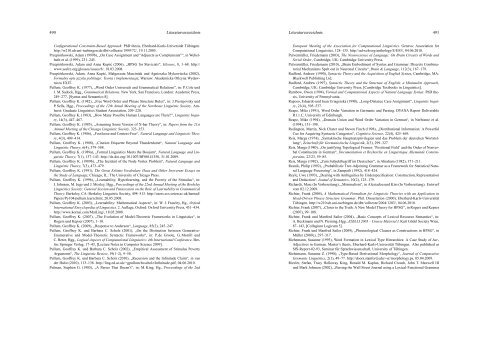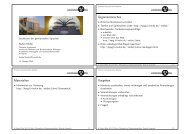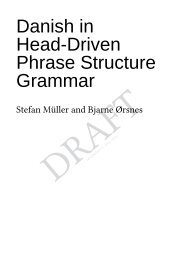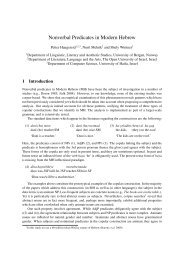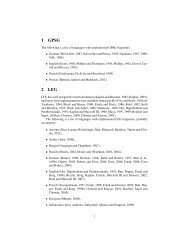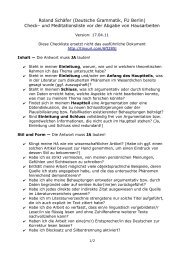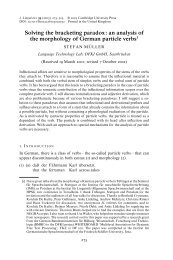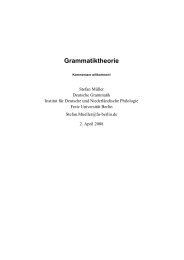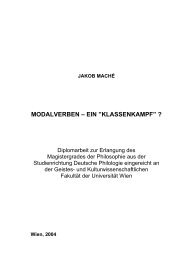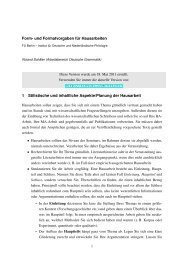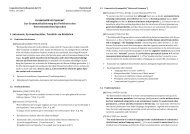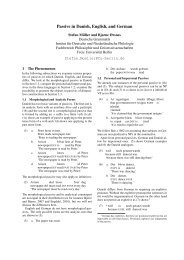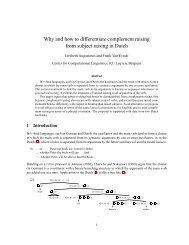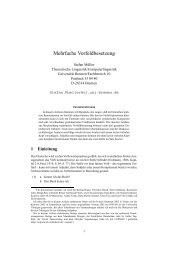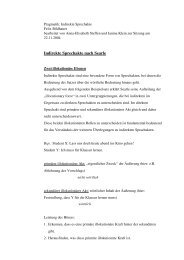Grammatiktheorie - German Grammar Group FU Berlin - Freie ...
Grammatiktheorie - German Grammar Group FU Berlin - Freie ...
Grammatiktheorie - German Grammar Group FU Berlin - Freie ...
Sie wollen auch ein ePaper? Erhöhen Sie die Reichweite Ihrer Titel.
YUMPU macht aus Druck-PDFs automatisch weboptimierte ePaper, die Google liebt.
490 Literaturverzeichnis<br />
Configurational Constraint-Based Approach. PhD thesis, Eberhard-Karls-Universität Tübingen.<br />
http://w210.ub.uni-tuebingen.de/dbt/volltexte/1999/72/, 19.11.2005.<br />
Przepiórkowski, Adam (1999b), „On Case Assignment and “Adjuncts as Complements”“, in Webelhuth<br />
et al. (1999), 231–245.<br />
Przepiórkowski, Adam und Anna Kup´sć (2006), „HPSG for Slavicists“, Glossos, 8, 1–68. http://<br />
www.seelrc.org/glossos/issues/8/, 18.03.2008.<br />
Przepiórkowski, Adam, Anna Kup´sć, Małgorzata Marciniak und Agnieszka Mykowiecka (2002),<br />
Formalny opis j˛ezyka polskiego: Teoria i implementacja, Warsaw: Akademicka Oficyna Wydawnicza<br />
EXIT.<br />
Pullum, Geoffrey K. (1977), „Word Order Universals and Grammatical Relations“, in: P. Cole und<br />
J. M. Sadock, Hgg., Grammatical Relations. New York, San Francisco, London: Academic Press,<br />
249–277, [Syntax and Semantics 8].<br />
Pullum, Geoffrey K. (1982), „Free Word Order and Phrase Structure Rules“, in: J. Pustejovsky und<br />
P. Sells, Hgg., Proceedings of the 12th Anual Meeting of the Northeast Linguistic Society. Amherst:<br />
Graduate Linguistics Student Association, 209–220.<br />
Pullum, Geoffrey K. (1983), „How Many Possible Human Languages are There?“, Linguistic Inquiry,<br />
14(3), 447–467.<br />
Pullum, Geoffrey K. (1985), „Assuming Some Version of X-bar Theory“, in: Papers from the 21st<br />
Annual Meeting of the Chicago Linguistic Society. 323–353.<br />
Pullum, Geoffrey K. (1986), „Footloose and Context-Free“, Natural Language and Linguistic Theory,<br />
4(3), 409–414.<br />
Pullum, Geoffrey K. (1988), „Citation Etiquette Beyond Thunderdome“, Natural Language and<br />
Linguistic Theory, 6(4), 579–588.<br />
Pullum, Geoffrey K. (1989a), „Formal Linguistics Meets the Boojum“, Natural Language and Linguistic<br />
Theory, 7(1), 137–143. http://dx.doi.org/10.1007/BF00141350, 31.01.2009.<br />
Pullum, Geoffrey K. (1989b), „The Incident of the Node Vortex Problem“, Natural Language and<br />
Linguistic Theory, 7(3), 473–479.<br />
Pullum, Geoffrey K. (1991), The Great Eskimo Vocabulary Hoax and Other Irreverent Essays on<br />
the Study of Language, Chicago, IL: The University of Chicago Press.<br />
Pullum, Geoffrey K. (1996), „Learnability, Hyperlearning, and the Poverty of the Stimulus“, in:<br />
J. Johnson, M. Juge und J. Moxley, Hgg., Proceedings of the 22nd Annual Meeting of the Berkeley<br />
Linguistics Society: General Session and Parasession on the Role of Learnability in Grammatical<br />
Theory. Berkeley, CA: Berkeley Linguistic Society, 498–513. http://users.ecs.soton.ac.uk/harnad/<br />
Papers/Py104/pullum.learn.html, 20.05.2008.<br />
Pullum, Geoffrey K. (2003), „Learnability: Mathematical Aspects“, in: W. J. Frawley, Hg., Oxford<br />
International Encyclopedia of Linguistics. 2. Auflage, Oxford: Oxford University Press, 431–434.<br />
http://www.kornai.com/MatLing/, 18.05.2008.<br />
Pullum, Geoffrey K. (2007), „The Evolution of Model-Theoretic Frameworks in Linguistics“, in<br />
Rogers und Kepser (2007), 1–10.<br />
Pullum, Geoffrey K. (2009), „Response to Anderson“, Language, 85(2), 245–247.<br />
Pullum, Geoffrey K. und Barbara C. Scholz (2001), „On the Distinction between Generative-<br />
Enumerative and Model-Theoretic Syntactic Frameworks“, in: P. de Groote, G. Morrill und<br />
C. Retor, Hgg., Logical Aspects of Computational Linguistics: 4th International Conference. <strong>Berlin</strong>:<br />
Springer Verlag, 17–43, [Lecture Notes in Computer Science 2099].<br />
Pullum, Geoffrey K. und Barbara C. Scholz (2002), „Empirical Assessment of Stimulus Poverty<br />
Arguments“, The Linguistic Review, 19(1–2), 9–50.<br />
Pullum, Geoffrey K. und Barbara C. Scholz (2010), „Recursion and the Infinitude Claim“, in van<br />
der Hulst (2010), 113–138. http://ling.ed.ac.uk/~gpullum/bcscholz/Infinitude.pdf, 04.06.2010.<br />
Pulman, Stephen G. (1985), „A Parser That Doesn’t“, in: M. King, Hg., Proceedings of the 2nd<br />
Literaturverzeichnis 491<br />
European Meeting of the Association for Computational Linguistics. Geneva: Association for<br />
Computational Linguistics, 128–135. http://aclweb.org/anthology/E/E85/, 04.06.2010.<br />
Pulvermüller, Friedemann (2003), The Neuroscience of Language: On Brain Circuits of Words and<br />
Serial Order, Cambridge, UK: Cambridge University Press.<br />
Pulvermüller, Friedemann (2010), „Brain Embodiment of Syntax and <strong>Grammar</strong>: Discrete Combinatorial<br />
Mechanisms Spelt out in Neuronal Circuits“, Brain & Language, 112(3), 167–179.<br />
Radford, Andrew (1990), Syntactic Theory and the Acquisition of English Syntax, Cambridge, MA:<br />
Blackwell Publishing Ltd.<br />
Radford, Andrew (1997), Syntactic Theory and the Structure of English: a Minimalist Approach,<br />
Cambridge, UK: Cambridge University Press, [Cambridge Textbooks in Linguistics].<br />
Rambow, Owen (1994), Formal and Computational Aspects of Natural Language Syntax. PhD thesis,<br />
University of Pennsylvania.<br />
Raposo, Eduardo und Juan Uriagereka (1990), „Long-Distance Case Assignment“, Linguistic Inquiry,<br />
21(4), 505–537.<br />
Reape, Mike (1991), Word Order Variation in <strong>German</strong>ic and Parsing. DYANA Report Deliverable<br />
R1.1.C, University of Edinburgh.<br />
Reape, Mike (1994), „Domain Union and Word Order Variation in <strong>German</strong>“, in Nerbonne et al.<br />
(1994), 151–198.<br />
Redington, Martin, Nick Chater und Steven Finch (1998), „Distributional Information: A Powerful<br />
Cue for Acquiring Syntactic Categories“, Cognitive Science, 22(4), 425–469.<br />
Reis, Marga (1974), „Syntaktische Hauptsatzprivilegien und das Problem der deutschen Wortstellung“,<br />
Zeitschrift für <strong>German</strong>istische Linguistik, 2(3), 299–327.<br />
Reis, Marga (1980), „On justifying Topological Frames: ‘Positional Field’ and the Order of Nonverbal<br />
Constituents in <strong>German</strong>“, Documentation et Recherche en Linguistique Allemande Contemporaine,<br />
22/23, 59–85.<br />
Reis, Marga (1982), „Zum Subjektbegriff im Deutschen“, in Abraham (1982), 171–211.<br />
Resnik, Philip (1992), „Probabilistic Tree-Adjoining <strong>Grammar</strong> as a Framework for Statistical Natural<br />
Language Processing“, in Zampoili (1992), 418–424.<br />
Reyle, Uwe (1993), „Dealing with Ambiguities by Underspecification: Construction, Representation<br />
and Deduction“, Jounal of Semantics, 10(2), 123–179.<br />
Richards, Marc (In Vorbereitung), „Minimalism“, in Alexiadou und Kiss (In Vorbereitung). Entwurf<br />
vom 02.12.2009.<br />
Richter, Frank (2004), A Mathematical Formalism for Linguistic Theories with an Application in<br />
Head-Driven Phrase Structure <strong>Grammar</strong>. Phil. Dissertation (2000), Eberhard-Karls-Universität<br />
Tübingen. http://w210.ub.uni-tuebingen.de/dbt/volltexte/2004/1203/, 04.06.2010.<br />
Richter, Frank (2007), „Closer to the Truth: A New Model Theory for HPSG“, in Rogers und Kepser<br />
(2007), 99–108.<br />
Richter, Frank und Manfred Sailer (2004), „Basic Concepts of Lexical Resource Semantics“, in:<br />
A. Beckmann und N. Preining, Hgg., ESSLLI 2003 – Course Material I. Kurt Gödel Society Wien,<br />
87–143, [Collegium Logicum 5].<br />
Richter, Frank und Manfred Sailer (2009), „Phraseological Clauses as Constructions in HPSG“, in<br />
Müller (2009c), 297–317.<br />
Riehemann, Susanne (1993), Word Formation in Lexical Type Hierarchies: A Case Study of bar-<br />
Adjectives in <strong>German</strong>. Master’s thesis, Eberhard-Karls-Universität Tübingen. Also published as<br />
SfS-Report-02-93, Seminar für Sprachwissenschaft, University of Tübingen.<br />
Riehemann, Susanne Z. (1998), „Type-Based Derivational Morphology“, Journal of Comparative<br />
<strong>German</strong>ic Linguistics, 2(1), 49–77. http://doors.stanford.edu/~sr/morphology.ps, 05.04.2009.<br />
Riezler, Stefan, Tracy Holloway King, Ronald M. Kaplan, Richard Crouch, John T. Maxwell III<br />
und Mark Johnson (2002), „Parsing the Wall Street Journal using a Lexical-Functional <strong>Grammar</strong>


